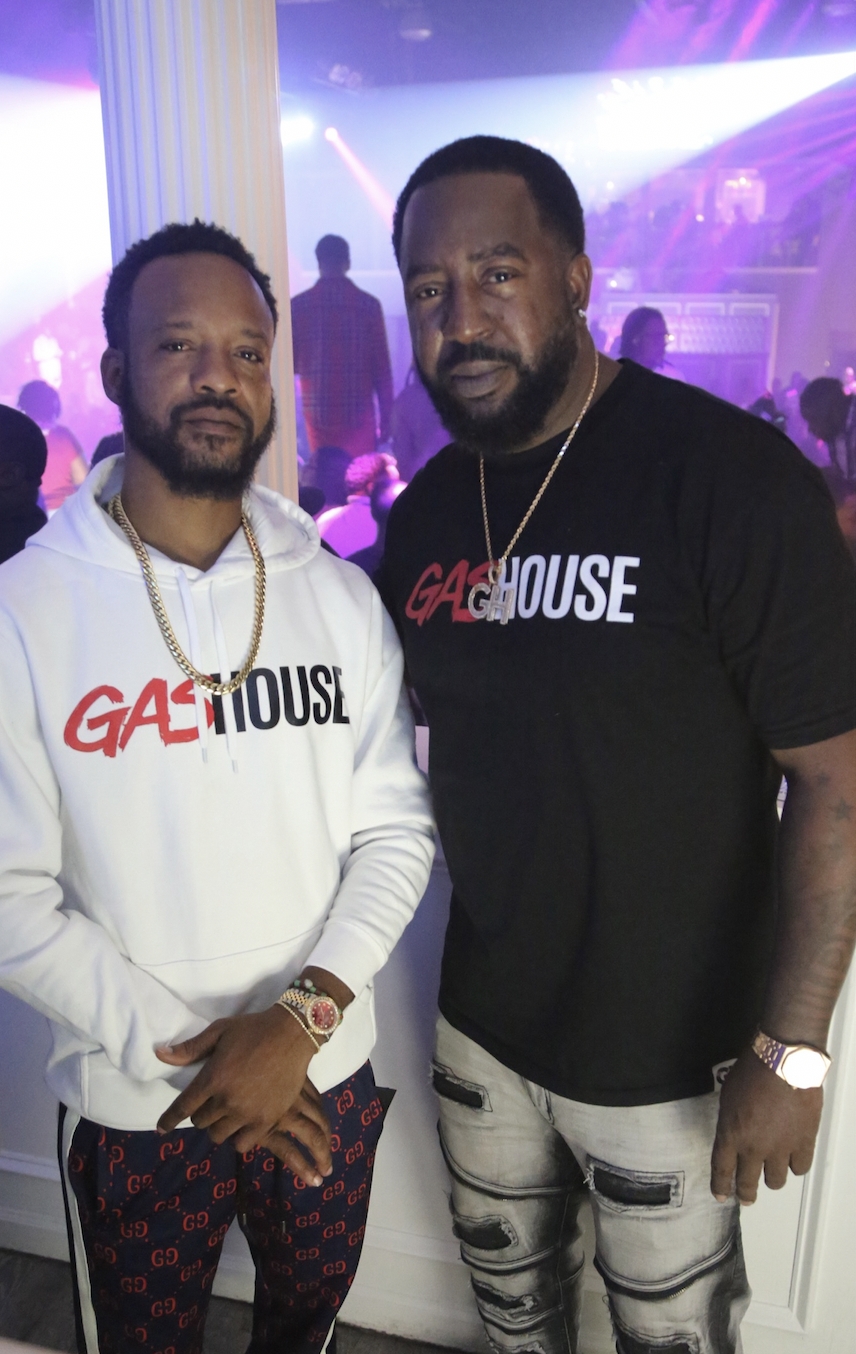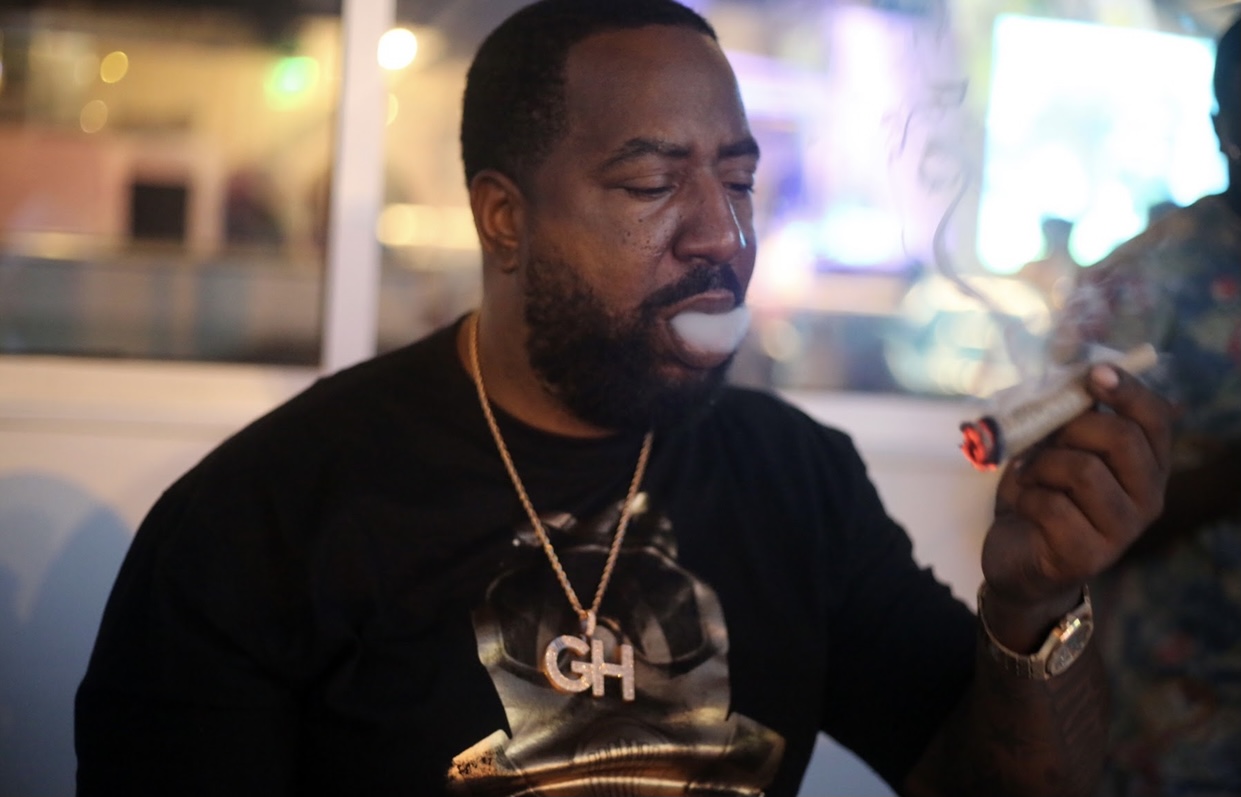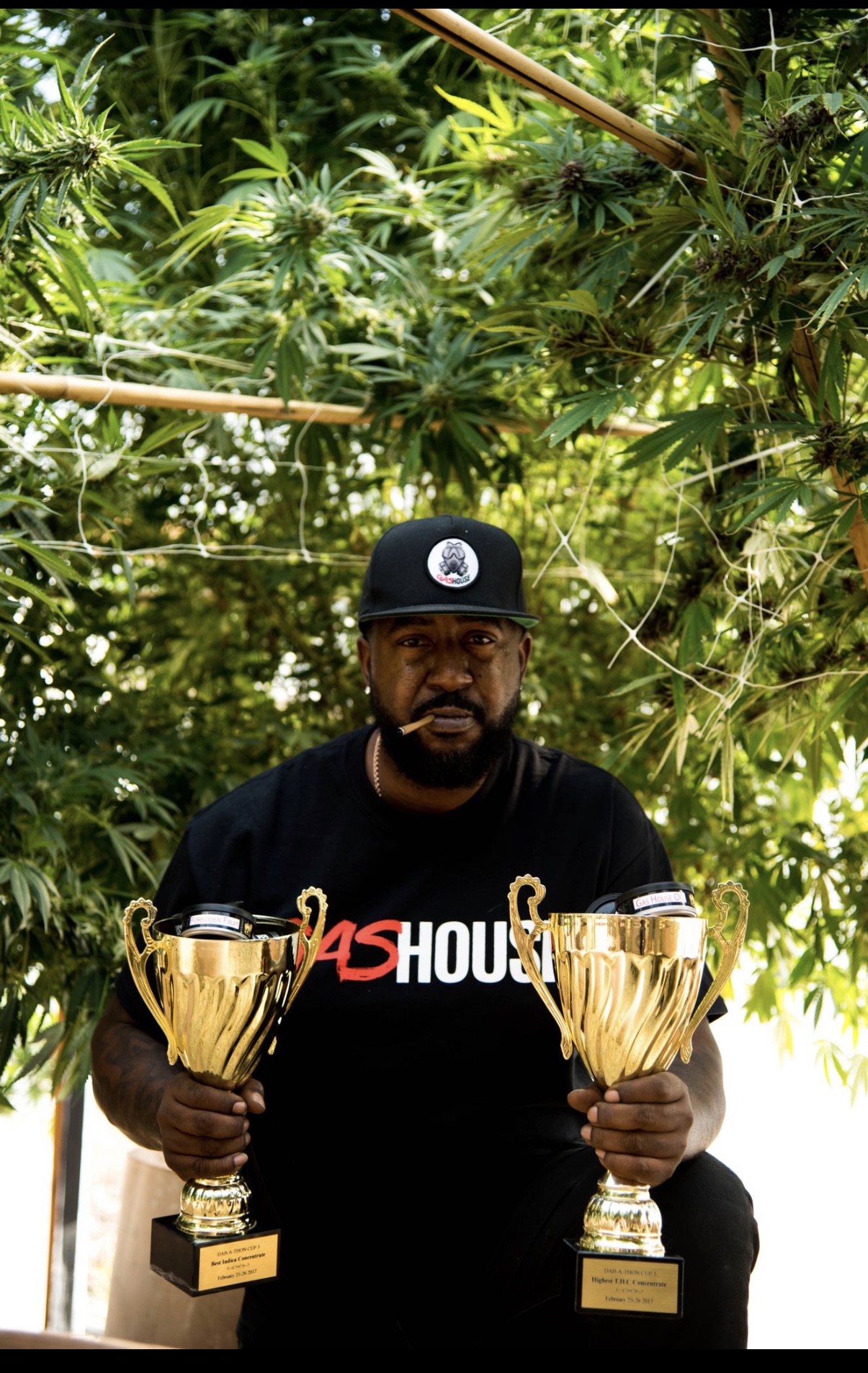The act of rolling up to a weed spot with little more than ID in hand is a luxury that Cali-based potheads like myself take for granted. But unless you’re currently living in California or one of the 15 other fully weed legal states, it’s not a convenience that every American is free to experience. That said, the cannabis industry has been booming since long before the legalization push began — meaning that know-how and trade secrets aren’t intrinsically linked to what’s on a person’s resume.
So it goes with Felix Murry and Kingston (who goes by a mononym), the brains behind independently owned Cannabis Cup-winning brand GasHouse. While their expertise is undeniable, much of it predates medical-based legalization in Georgia (and decriminalization in Atlanta). In other words, by the time GasHouse became a legitimate brand with a real name based on the West Coast, the duo had built their reputations throughout ATL and beyond.
“Me and Kingston met through a mutual friend,” Murry tells me over the phone. “I was with a friend of mine that lives in Georgia, we were smoking a joint one day and it was really, really good product. So I asked him where he got it and he told me he had gotten it from a friend of his who grew it locally. He introduced us and once I talked to Kingston I realized how knowledgeable he was in the field of cultivation… I had never really met anyone down south that was as advanced as he was.”
In seven short years, GasHouse has gone from a fully underground grow operation in the suburbs of Atlanta to a six-time Cannabis Cup winning weed brand operating in multiple states. We linked with Murry and Kingston to talk good weed, what they think about celebrities entering the weed space, and the future of cannabis — from the questions you need to start asking your budtender to how the industry needs to change in response to the failed war on drugs.

I know you have both been in the industry — both in a mainstream respect and an underground one — for some time. But how did you get into the cultivation aspect of cannabis?
Kingston: We were doing it underground for a while, but maybe 2001 was when I was first introduced to the cultivation. I was living in the Florida area at the time. Long story short, a guy showed me a grow room and life has never been the same! I was so intrigued by cannabis, I had never seen it in that form before, I always only saw it right before smoking it, getting ready to break it down. But my first time ever seeing cannabis growing in a room, I never even thought that was possible. From that day I just started growing. I put together my first grow house and I just kept getting better at it as years got along, and into this thing, it has become now. Cannabis is mainstream now, but when I started you couldn’t even mention you grew cannabis.
Way before mainstream, we were doing it. So when it did finally become mainstream, it was easy for us. I wouldn’t say easy… but it was kind of like a plug-and-play — we had already so much experience. We had been doing it so long, it just wasn’t a brand before. There are people that own cannabis brands, but we’re coming from the culture of the underground scene. In the era when we didn’t have a name, we were already doing what we loved. We had to be secretive and undercover, you couldn’t tell the closest person to you about it, that’s the culture I came from, that’s how I was taught.
https://www.instagram.com/p/CNbQas6gKvF/
Obviously having experience moving product gave you some sort of business advantage, but what disadvantages did you encounter? I’m thinking regulatory roadblocks you had to get through now that didn’t exist before.
Kingston: Well we had to relearn everything on the fly. We ended up leaving Georgia and going out west to Oregon when it became regulatory. We never knew we would encounter things like that, we had to go down to the county and city to get certain licenses. Trying to hire lawyers… the frustrating part is that rules are still coming out, the lawyer might get the statute on Monday, but everyone got it on Monday, so the lawyers didn’t really know anything. They were learning as we were learning, but we needed licenses fast, you get charged money but you’re not getting any results. So we had to learn to read the laws ourselves and figure them out ourselves. We had to go to the county every day. People will help you along the way here and there, but that was the only way to do it.
Once a new statute drops everyone wants to get in, the lawyers are reading and learning, it’s just one of those things you have to be so passionate about you have to seek out the knowledge. Along the path of that we figured it out, though. We got our recreational growing licenses in Oregon without a lawyer’s help, just a team of people having a passion and wanting it badly.

I’ve read that helping young people of color through the industry is a passion project for the brand. How is GasHouse helping specifically and how do you hope to continue that?
Felix: One of the first things we did when we came to California was hire a young group of guys that we brought into the facility we were opening in Oakland. Some of them had experience from the underground market, some didn’t have experience at all. We started training them, teaching them how to cultivate, how to package cannabis, teaching them the regulatory laws of California, all of those guys are still involved in the industry. They went to other states, took the knowledge, and built on top of it. We always have groups we are mentoring in the Bay Area.
What is your opinion on celebrities gobbling up the cannabis space?
[Both start laughing.]
Kingston: It’s funny to us! We’ve been doing it so long. I remember doing this back in the day, the first time I felt fear, maybe it was in 2003. I remember walking out to my mailbox and getting my mail. I could smell it. I got the whiff of it, “Oh my god, it’s my house! I can smell it.”
This was the time when — if I would’ve gotten caught — I would’ve got 30 years in prison. And I knew that! But I had so much love for the plant, I didn’t feel like I was doing anything wrong. How could I get in trouble for growing a plant? So now, you put in all that sacrifice for that many years, you keep things going, you share that medicine with all these people way before a celebrity even thought about touching it.
Even to the point when we started in 2015 and talked about building our brand. Celebrities didn’t want to get involved publically.
Felix: They were scared to death!
Kingston: Didn’t want to get in, or be a solid investor, nothing! So to see everyone in the last 12 months come out of the woodwork, we laugh at it.
Felix: It’s not that easy building a brand in cannabis. Just because you put your face on it doesn’t mean people are going to buy it. It’s a lot deeper than that to build a following in cannabis. Laughing, singing, even playing sports, it always takes someone to be involved in a business to make that thing successful.
I’ll give you an example — The Gary Payton strain. If Gary Payton’s strain wasn’t pushed by people that had been involved in the cannabis business for 20 plus years, it wouldn’t have been successful. It would’ve flopped like every new strain. Because of the people that were involved in introducing that strain to the world and the respect and authority that they’ve had — that’s what made that strain a success. We can go down a list of celebrities, most have failed. They just use their celebrity as the only thing to get people to try the product. But if it’s not good, it’s not good.
Kingston: I think it worked when cannabis was illegal, Snoop Dogg, Wiz Khalifa, even Bob Marley, those were the faces of cannabis back then. The cultivators like me, we could never be the face. We were hunted!
Felix: If anything, the strains were the faces!
Kingston: Right. But only celebrities could promote it back then. They could smoke it on stage, or in a music video. Back then you didn’t know where it came from you thought it came from Mexico or the mountains of somewhere back in those days.
But think about it. Snoop Dogg isn’t big in cannabis. Wiz Khalifa isn’t big in cannabis. We have a change going on, people are starting to understand cannabis in a different way because the cultivators are saying different things like “We should smoke clean cannabis, what about the pesticides, who grew it, what brand is it coming from, what facility? Has It been tested?”
Sometimes you have things in cannabis that shouldn’t be used. We’re talking about genetics and pesticides, that’s a different way of thinking that’s never been done before. Growers weren’t about to come out and say anything back in the day.
Felix: There was a time in cannabis when it was all about money and growing stuff so people would use things that were bad to ingest just to have a bountiful crop, but me and Kingston were not with that. That’s using cheat codes, we want people to be safe when using our products and associate our brand with something clean. When I see Coca-Cola, I don’t think about it I just grab it. I know it’s going to be good. I know it’s going to taste the same. I want GasHouse to be the same thing. You see GasHouse, you grab it, you’re getting something reputable and clean. What you see is what you get.
https://www.instagram.com/p/CMnunhjFS9t/
What questions aren’t people asking when they buy weed? There has to be something more to it than looking for the highest THC?
Kingston: That’s the number one question! Everybody just thinks about the THC, if it’s high and I’m totally against that. Understand it takes more than just high, you’ve got cannabinoids and terpenes, all of these things add up to give you the experience. You can have 50% THC, what you’re going to smoke is not enjoyable, you’re just going to fall on the couch and go to sleep.
But you’ve got different terpenes that change moods. Think about lavender, people burn lavender or rub it on their skin, because it gives you a calming effect. You have 100 or something cannabinoids. The ones we know about are Delta 9, THC, CBD… everybody knows those but there are over 100 and they all give you a different feeling, and they need to have a balance. Those terpenes are going to make it enjoyable to inhale, that cannabinoid is going to make you sleepy, that Delta 9 is going to give you the psychoactive effect. It’s all about balance.
Most of the customers just know THC and maybe the budtender even only knows THC. That’s all we ever knew was high high high. These narratives are beginning to change and that’s happening industry-wide.
Is it hard to develop new strains to compete against old classics like Grand Daddy Purp, Skywalker, etc?
Felix: When it comes to our customer base, I guess we have a feel for their palate. Just like a winemaker knows the grapes to use for his particular following, the flavors that they may like. Or a bourbon maker knows the palate he’s making for. When we have a strain, we try to take two strains that have characteristics we like, then we think about who our customer is, what kind of terpenes they are looking for.
Take Jack Herer, for example. As great as it is, that’s not something our customer base would be into. So you have to know your customer.

I want to get deeper into organic and natural gardening. What’s the GasHouse philosophy on growing?
Kingston: I’ve been talking about organics for years and then I stopped because people didn’t care enough. We have a whole green movement going on on the planet, we have vegans and people who don’t want to eat meat anymore because of sustainability reasons and greenhouse gases and these sorts of things but nobody seems to care where the cannabis comes from. They don’t question what’s in there, cannabis is sometimes 90 percent synthetics feeding! You have vegans and healthy people smoking any kind of bud — it makes no sense to me at all. When I started saying this years ago, I got a lot of pushback. A lot of growers and farmers didn’t like me saying that, and exposing that, that you’re not supposed to grow ingestible plants with certain things.
You also hear a lot of “Organics is trash, it’s not good, it’s garbage product,” which makes no logical sense to me at all. I’ve grown good organics, organic cannabis can be great, it can be expensive also and that’s what it’s all about. They don’t want to grow it because it takes more time, more money, more passion as a grower to cultivate it. I also feel like it’s going to be a thing of the future once people realize and testing starts becoming more strenuous and strict. Pesticides aren’t good!
Obviously, the industry is going through some rapid changes right now — what does the weed industry need to do better going forward?
Felix: I would like to see it more inclusive in other states. California had a good idea. They made a good step in the right direction as far as making an industry where everyone can get potentially paid. What I have seen other states do is let private corporations come through and create monopolies and the local citizens aren’t benefiting off of it at all. I would like to see some of the guidelines become not as strenuous as they are in other states.
It’s hard for a regular person to come up with a million dollars to invest in a buildout and plus up to $200,000 for non-refundable application fees, whether they get it or not and I think that was put in place to keep certain people out. That’s the part that I think should be worked on because that’s trying to put a divide between regular people and this plant and that’s taking a big corporate direction. I don’t know if you can stop that because it’s billions maybe trillions of dollars in play but I wish you could change that.
Kingston: Some places and good people are trying. The city of Oakland tried with their social equity program, they had to iron out some kinks though because what you realize is you give people a social equity chance but they don’t have business or finance skills to run that social equity license. They don’t have business know-how or finances to move forward to make the business successful.
Florida didn’t even give people a chance. Georgia same way. That negatively affects the people most impacted by drugs. So many people in South Florida have been going to jail for cannabis since God knows when and they knew nothing about this licensing thing for medical marijuana, the state just snuck it in, did it, and it was over. Every city impacted by the drug war and the prison population should automatically have a social equity program for minorities. That needs to happen.
Right now, from a consumer, grower, and customer perspective, what is the best state for cannabis?
Felix: Oklahoma. I would say as of right now, it’s still not heavily regulated so that is the reason so many growers and brands are expanding into Oklahoma because the taxes and fees are a lot cheaper. I think it’s 17% tax in Oklahoma compared to 35%-40% in California, the state has put us in a situation where you have to give all of your money to taxes. Oklahoma took a different approach and it makes it very attractive for people to go there.
But it’ll probably end up like Oregon, so many people will go to Oklahoma soon, it’s a very attractive place to build a war chest, and build big bucks in cash to make other plays in Detroit, New York, and whatever else opens up.
What can people expect from GasHouse this year?
Felix: We are currently in expansion, opening up in Michigan, Maryland, Arizona, we are rapidly expanding the brand in other states and working really hard on our hemp and CBD products, that’s been our baby for the last couple of years. We are in most states with that, but we are really drilling down on that this year. Hemp, CBD… Wellness, people are really excited about that so we are carving out our space.
Kingston: We started out the brand at the right time so we have that brand recognition to win cannabis cups and certain things and people talk about us, word of mouth, we continue to come with the quality because we take the high road. We believe in quality first, it’s not about the money, it’s about continuing to build market value in our brand.







